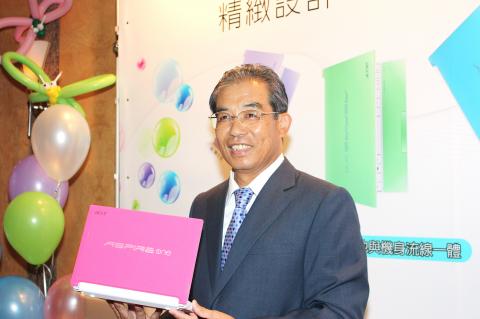Despite a rising threat from tablet PCs, netbooks are here to stay, said Scott Lin (林顯郎), president of Acer Inc’s (宏碁) Taiwan operations, yesterday.
“When netbooks were launched in 2007, I was asked the same question about whether they would replace traditional notebooks,” Lin told reporters yesterday. “Notebooks still exist today.”
He said “brand new star products” — such as the Eee PC introduced in 2007 by Asustek Computer Inc (華碩電腦) and the iPad from Apple Inc — would grab the public’s attention who would develop a fondness for them.

PHOTO: CHUO I-CHUN, TAIPEI TIMES
Competition will increase, but tablets won’t be able to eat away at the whole netbook pie, he said.
Citing statistics from Gartner Inc, Lin said worldwide netbook shipments this year would post 9 percent growth from last year to 35.6 million units and that number will approach 50 million in 2014.
Acer, the world’s second--largest PC brand, is the largest netbook brand and will ship about 10 million netbooks worldwide this year, he said.
However, Lin kept mum on the launch date for the company’s -tablet PC, only saying the company would launch products that will “wow the market with a strong selling point.”
Supply chain sources have said Acer is set to test the waters in Europe and the US by rolling out its first tablet model, which runs on a Windows operating system, this month.
The company yesterday -unveiled the industry’s first slew of netbooks with dual-core processors. The new “Happy” Aspire One netbooks feature dual operating systems — Android and Windows 7 Starter — and have a built-in 250GB hard drive, a specification that exceeds the maximum 160GB offered by the earlier generation.
The price tag is NT$13,800 (US$431) and they will be available in Taiwan this month.

In Italy’s storied gold-making hubs, jewelers are reworking their designs to trim gold content as they race to blunt the effect of record prices and appeal to shoppers watching their budgets. Gold prices hit a record high on Thursday, surging near US$5,600 an ounce, more than double a year ago as geopolitical concerns and jitters over trade pushed investors toward the safe-haven asset. The rally is putting undue pressure on small artisans as they face mounting demands from customers, including international brands, to produce cheaper items, from signature pieces to wedding rings, according to interviews with four independent jewelers in Italy’s main

Japanese Prime Minister Sanae Takaichi has talked up the benefits of a weaker yen in a campaign speech, adopting a tone at odds with her finance ministry, which has refused to rule out any options to counter excessive foreign exchange volatility. Takaichi later softened her stance, saying she did not have a preference for the yen’s direction. “People say the weak yen is bad right now, but for export industries, it’s a major opportunity,” Takaichi said on Saturday at a rally for Liberal Democratic Party candidate Daishiro Yamagiwa in Kanagawa Prefecture ahead of a snap election on Sunday. “Whether it’s selling food or

CONCERNS: Tech companies investing in AI businesses that purchase their products have raised questions among investors that they are artificially propping up demand Nvidia Corp chief executive officer Jensen Huang (黃仁勳) on Saturday said that the company would be participating in OpenAI’s latest funding round, describing it as potentially “the largest investment we’ve ever made.” “We will invest a great deal of money,” Huang told reporters while visiting Taipei. “I believe in OpenAI. The work that they do is incredible. They’re one of the most consequential companies of our time.” Huang did not say exactly how much Nvidia might contribute, but described the investment as “huge.” “Let Sam announce how much he’s going to raise — it’s for him to decide,” Huang said, referring to OpenAI

The global server market is expected to grow 12.8 percent annually this year, with artificial intelligence (AI) servers projected to account for 16.5 percent, driven by continued investment in AI infrastructure by major cloud service providers (CSPs), market researcher TrendForce Corp (集邦科技) said yesterday. Global AI server shipments this year are expected to increase 28 percent year-on-year to more than 2.7 million units, driven by sustained demand from CSPs and government sovereign cloud projects, TrendForce analyst Frank Kung (龔明德) told the Taipei Times. Demand for GPU-based AI servers, including Nvidia Corp’s GB and Vera Rubin rack systems, is expected to remain high,